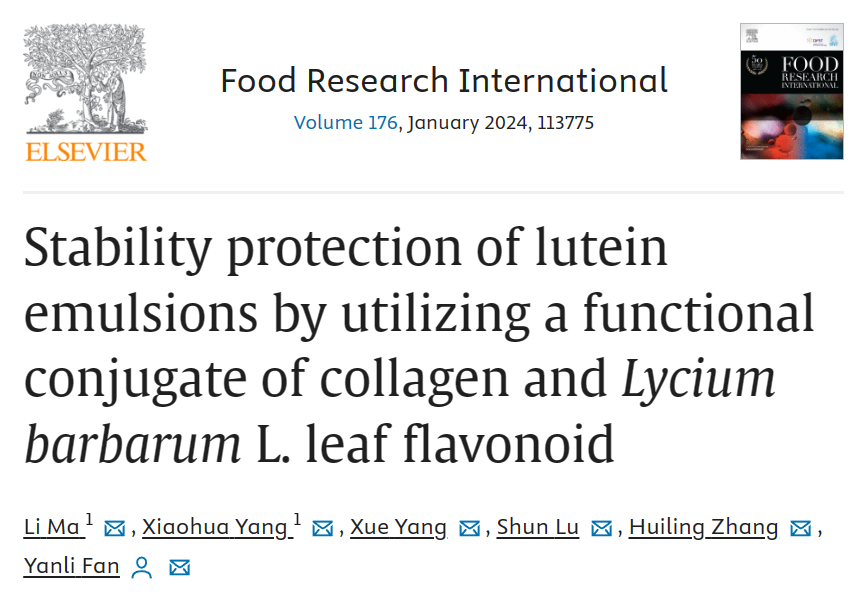
yl6809永利食品营养与健康创新团队范艳丽教授课题组在Food Research International(1区,IF8.1)发表题为“Stability protection of lutein emulsions by utilizing a functional conjugate of collagen andLycium barbarumL. leaf flavonoid”的研究性论文(胶原蛋白和枸杞叶黄酮的功能复合物对叶黄素乳液稳定性的保护作用),该研究受到宁夏回族自治区重点研发项目“枸杞源靶向食源性肠道炎症功能产品研发及产业化示范”(2022BBF02006)资金支持。
叶黄素具有良好的生物学功能,但其物理和化学性质不稳定。论文以胶原蛋白与枸杞叶黄酮类化合物(LBLF)为原料制备功能性乳化剂,对其进行结构表征和性能评价,并探讨该功能复合物对叶黄素乳液的稳定作用。研究表明,胶原蛋白-LBLF功能复合物的包封率为(68.67 ± 1.43)%,载药量为(6.92 ± 0.13)%。与LBLF复合后胶原蛋白结构和形态发生改变,提高了胶原蛋白的抗氧化能力,改善了其起泡和乳化性能。由胶原蛋白-LBLF功能复合物稳定的叶黄素乳液的硫代巴比妥酸值(0.0012 ± 0.00011)mg/kg显著低于胶原蛋白稳定的叶黄素乳液(0.0021 ± 0.00016)mg/kg (P < 0.05),表明功能复合物稳定的叶黄素乳液具有更高的稳定性。LBLF具有较高的自由基清除作用,可延缓贮藏过程中叶黄素的降解,提升其贮藏稳定性。在模拟胃肠道消化过程中,胶原蛋白-LBLF功能复合物有效地稳定了叶黄素乳液,避免其在胃肠道环境中被快速破坏,延缓释放速度,有利于叶黄素在下一步利用过程中的生物可及性。
研究结果:
1. 胶原蛋白-LBLF功能复合物的制备与结构表征
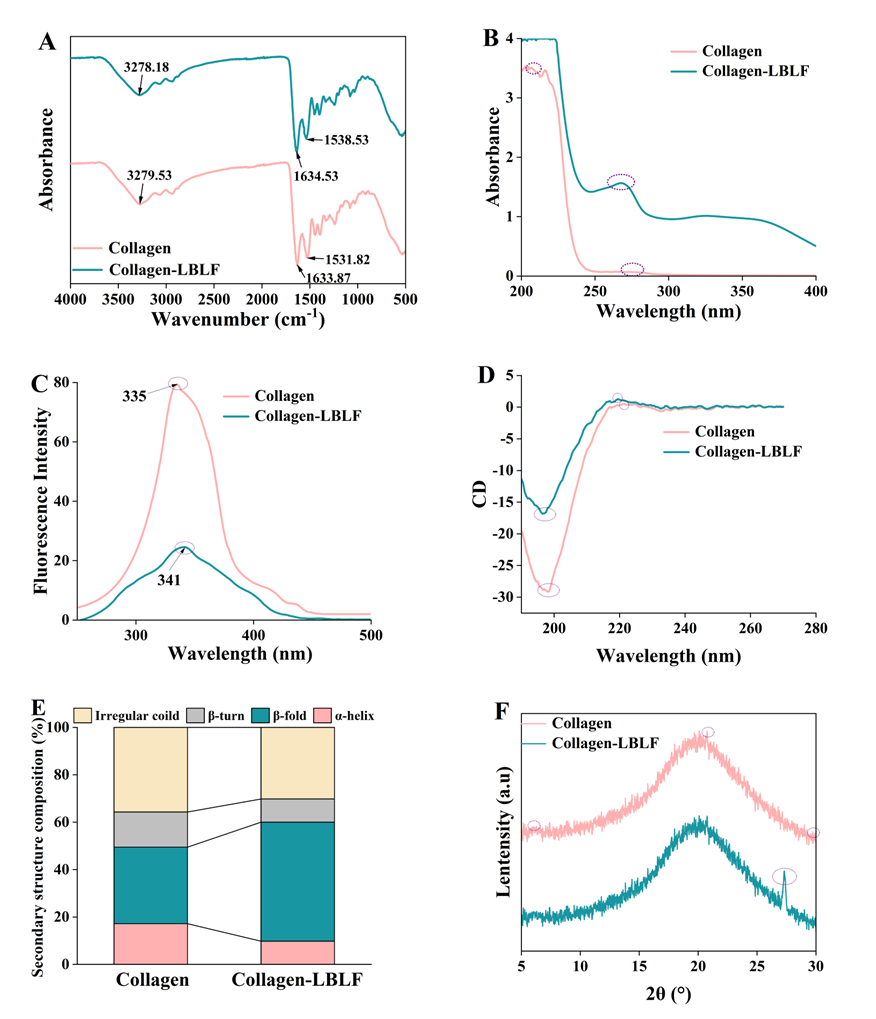
Fig. 1. Structural characterization of collagen and collagen-LBLF complexes. (A) Fourier-transform infrared spectra (FTIR). (B) UV–Visible absorption spectra. (C) Fluorescence spectra. (D) Circular dichroism (CD) spectra. (E) Relative content of collagen secondary structure. (F) X-ray diffraction (XRD) pattern
Table 1 Distance between molecular chains

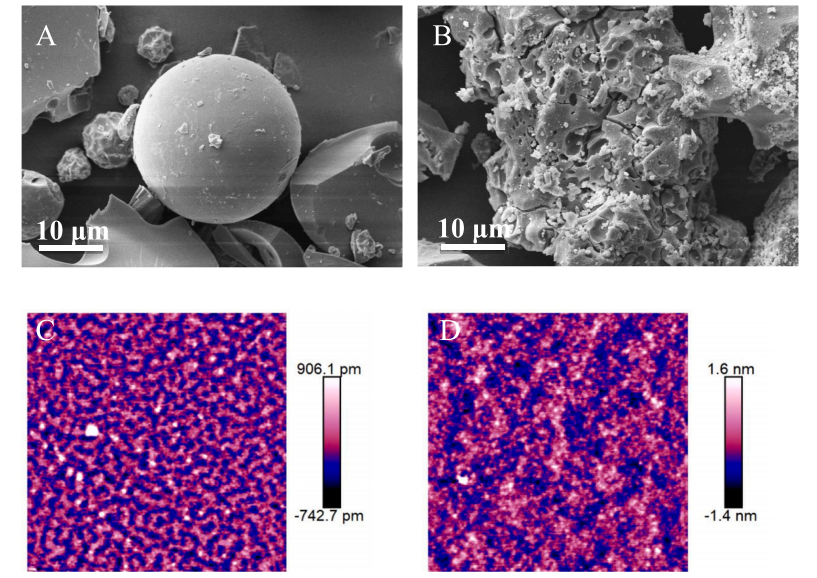
Fig. 2. Apparent morphology of collagen and collagen-LBLF complexes. (A) and (B) Scanning electron microscopy (SEM) of collagen and collagen-LBLF, Magnification of 1000 times (Mag = 1.0 KX). (C) and (D) Atomic force microscopy (AFM) of collagen and collagen-LBLF
2. 胶原蛋白-LBLF功能复合物的性能评价
Table 2 Comparison of antioxidant activity
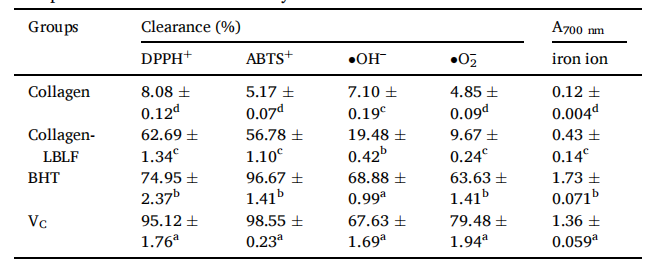
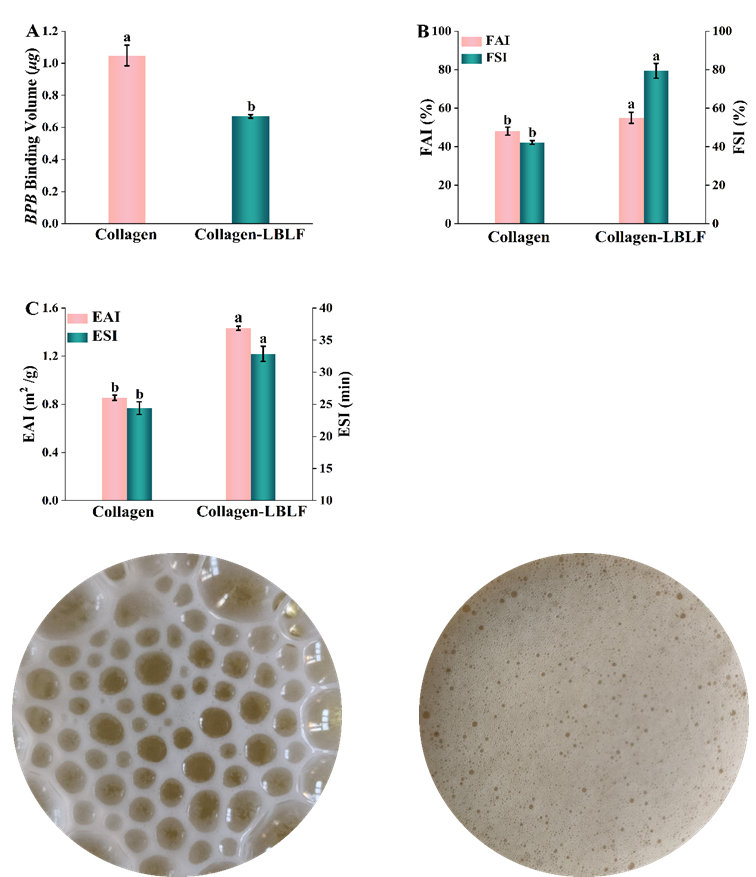
Fig. 3 Changes in the properties of collagen and collagen-LBLF. (A) Comparison of collagen and collagen-LBLF hydrophobicity. The higher the BPB binding volume,the higher the protein hydrophobicity. (B) Comparison of collagen and collagen-LBLF foaming ability and foam stability. Foaming capacity (FAI), foam stability (FSI). (C) Comparison of collagen and collagen-LBLF emulsification capacity and emulsion stability. Emulsification capacity (EAI), emulsion stability (ESI). (D) Collagen foam morphology diagram. (E) Collagen-LBLF foam morphology diagram. The magnification of Fig D and E are 1x. Data with different letters (a-b) in a column are significantly different (P < 0.05).
3. 胶原蛋白-LBLF功能复合物对叶黄素乳液性能的影响
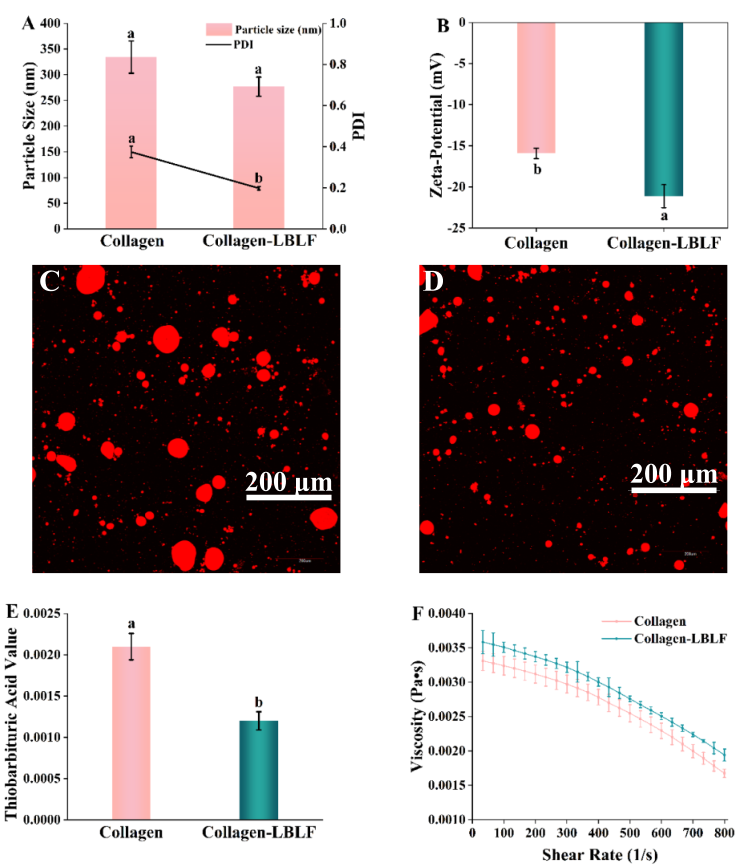
Fig. 4. Characterization of emulsions. (A) and (B) Particle size, PDI and zeta-potential of collagen and collagen-LBLF stabilized lutein emulsion. (C) Confocal laser scanning microscopic (CLSM) image of collagen. (D) Confocal laser scanning microscopic (CLSM) image of collagen-LBLF. (E) Antioxidant capacity of collagen and collagen-LBLF to stabilize emulsions, the higher the thiobarbituric acid value the weaker the antioxidant capacity of the emulsion. (F) Apparent viscosity of collagen and collagen-LBLF stabilizing emulsions. Data with different letters (a-b) in a column are significantly different (P < 0.05).
4. 胶原蛋白-LBLF功能复合物对叶黄素乳液的稳定作用
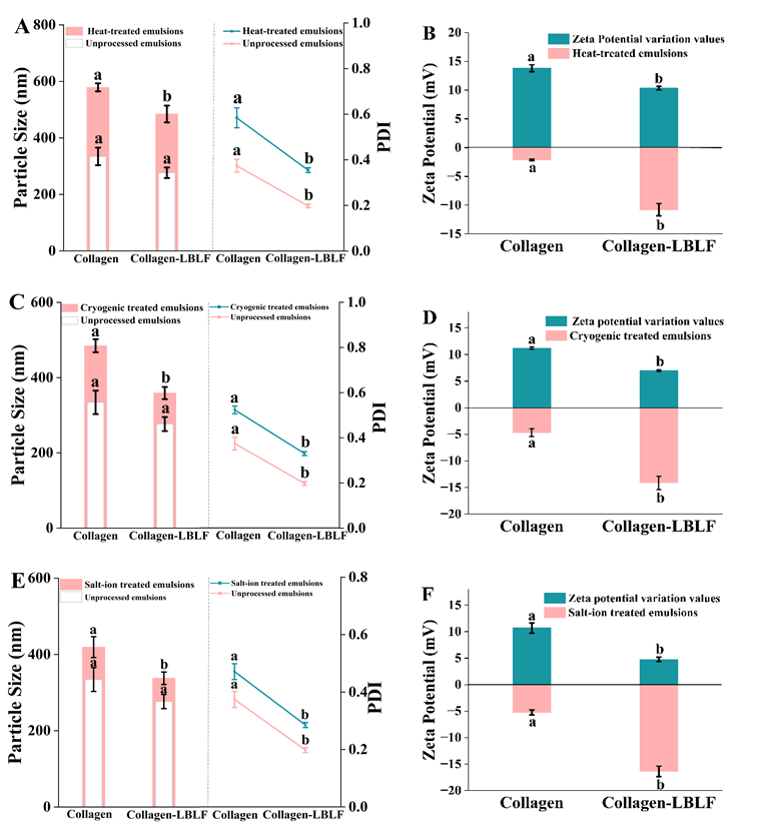
Fig. 5. Effect of physical environmental factors and ionic strength on the stability of emulsions. (A) and (B) Changes in particle size, PDI and zeta potential of emulsions under temperature stress. (C) and (D) Stability of emulsions under low temperature treatment conditions. (E) and (F) Effect of ionic strength on emulsion particle size, PDI and zeta point position. Data with different letters (a-b) in a column are significantly different (P < 0.05).
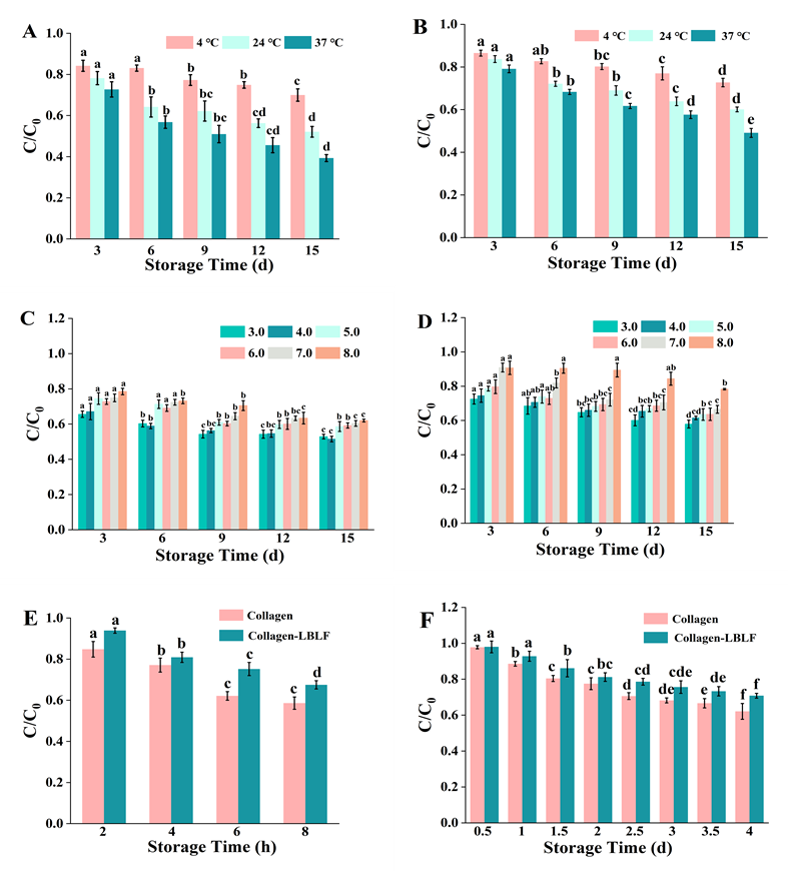
Fig.6. LuteinEmulsion Stability. (A) and (B) Effect of temperature during storage on the stability of lutein emulsions stabilized by collagen and collagen-LBLF. (C) and (D) Effect of pH on the stability of lutein emulsions stabilized by collagen and collagen-LBLF during storage. (E) Stability of lutein emulsions stabilized by collagen and collagen-LBLF under light conditions. (F) Emulsion stability under gastrointestinal simulation. Data with different letters (a-b) in a column are significantly different (P < 0.05).
原文链接:
https://doi.org/10.1016/j.foodres.2023.113775
撰稿人|马利